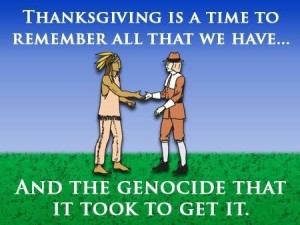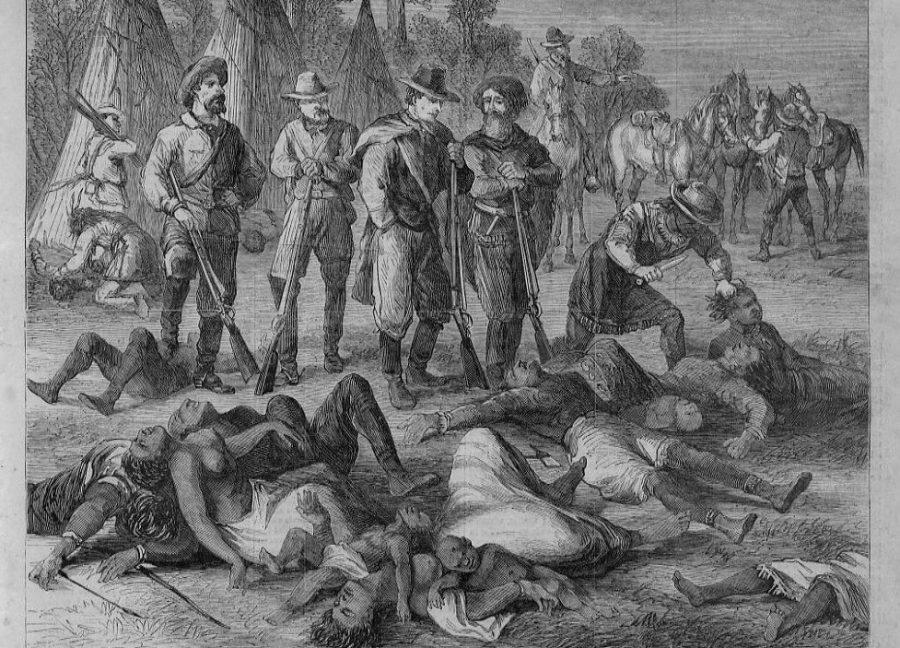Author: Atiya Irvin-Mitchell
For a person who loves stories that involve superheroes and wizards I find it odd that when it comes to real life, when it comes to history I prefer the truth. No matter how ugly or uncomfortable the truth might be. So here’s a seriously inconvenient truth: the history of Thanksgiving is evil.
Hear me out. Growing up like most kids I celebrated the holiday without protest. I made the obligatory turkeys in art class. I participated in elementary school renditions of “Over the River.” I contributed a cherry cheesecake to many a family dinner. I know every line in “A Charlie Brown Thanksgiving.” And yet, I now find seeing small children in their Pilgrim and “Indian” costumes to be downright disturbing. Why? I learned Thanksgiving’s true origin story reading a book called “Lies My Teacher Told Me.”
As children we are told a warm and fuzzy story about the Pilgrims and “Indians” who supposedly worked together to make the first Thanksgiving meal. It’s a nice story. It’s also unfortunately not entirely true.
On and off throughout history Thanksgiving feasts were held, but it wasn’t until 1863 Thanksgiving was proclaimed an annual and national holiday by Abraham Lincoln. President Lincoln decided to repackage the history into a warm and fuzzy story worthy of television specials mostly due to the fact that the country was tearing itself apart and the Union was in need of a moral boost. Although in his limited defense I guess he just wanted something to distract the American people from the brother against brother of it all.
In 1621, the Pilgrims and the Wampanoag people did have a feast. But that’s not exactly where Thanksgiving stems from. In 1637, in the New World when a dead white man was found in his boat, the nearby Pequot tribe in what would now be considered Connecticut were blamed his death. It seems the tribe and Pilgrims had a less than friendly relationship, but historians have conflicting opinions on what exactly happened to the man. They do agree that responding with all the rationality the situation required the Pilgrims opted to burn the Pequot tribe’s village to the ground.
English Major John Mason who lead his troops in killing the Pequot men, women, and children said:
“We must burn them! Such a dreadful terror let the Almighty fall upon their spirits that they would flee from us and run into the very flames. Thus did the Lord judge the heathen, filling the place with dead bodies.”
John Winthrop of the Massachusetts Bay Colony wrote of the event:
“Those that escaped the fire were slain with the sword; some hewed to pieces, others run through with their rapiers, so that they were quickly dispatched and very few escaped. It was conceived they thus destroyed about 400 at this time. It was a fearful sight to see them thus frying in the fire…horrible was the stink and scent thereof, but the victory seemed a sweet sacrifice, and they gave the prayers thereof to God, who had wrought so wonderfully for them.”
Once more with feeling: pure evil. Is it any wonder that Thanksgiving is a day of mourning for many Native Americans? There’s a saying that history is told by the people who win, I suppose in this case history is told by those who didn’t get their villages burnt to the ground. I’m aware it doesn’t flow quite as well, but the sentiment remains.
Why are we so desperate to pretend that the beginning of this holiday is anything less than one of the first chapters of the never ending horror story surrounding anything the United States government has had to do with Native Americans? #StandingRock

This Thanksgiving I’ll be thankful there are any Native People left at all.
We romanticize the past. It’s human to want to believe in fairy tales. That’s probably why we cling to stories about men in red sleighs. The truth sucks sometimes. It’s ugly, painful, and in this case, unfortunately genocidal. But, no less true. Which is why we have to stop romanticizing things that didn’t happen (#ColumbusDay) and things that never should have happened. We have to stop photoshopping the ugly parts of our history out because doing so does a disservice to those who were hurt the most and those who could learn to be better. Realistically this holiday isn’t going anywhere and I don’t have anything against taking time to give thanks with family, in between heated political debates. I just think now more than ever we need to deal honestly with our history, if for no other reason than to avoid repeating it.


